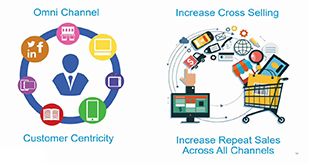 A type of Enterprise Resource Planning system particularly designed keeping omnichannel in focus for centralizing and streamlining workflows, processes and data in a manner to support a uniform shopping experience in all channels and devices. Using omnichannel ERP one can face success in every step of omnichannel retail.
A type of Enterprise Resource Planning system particularly designed keeping omnichannel in focus for centralizing and streamlining workflows, processes and data in a manner to support a uniform shopping experience in all channels and devices. Using omnichannel ERP one can face success in every step of omnichannel retail.
With data-driven omnichannel optimization and management strategies you can:
- Check performance metrics of the channels
- Compare e-commerce v/s physical point of contact network for all regions
- Divide customers based on channels and customer journey
- Measure probable gain and product portfolio structure based on omnichannel strategy
- Access channels of a specific locality in your product portfolio
- You get reconfiguration and overlapping chances, channel cannibalization including acquisitions and closures
The demand of data control is at the highest level at present for Omnichannel Retail in the various numbers of selling channels.
Omnichannel is the scheme of a range of selling channels linked mutually to make sure unspoiled consumer experience at a high pace and fitting shopping manner. Since Omnichannel has a large number of channels it strains over urbane data management and helps managers with power over situation.
Look into the core features based on which you can select a new ERP system for your omnichannel business:
- Strong E-Commerce Integrations – E-commerce integrations should be robust and must be able to keep pace with business needs, which is important for any growing omnichannel business in today’s Omnichannel business. ERP system should be able to integrate with the channels you select. The channels you select can be a leading e-commerce channel or a marketplace like Amazon or eBay. You should also find the number of orders per hour that can be downloaded into your ERP from the channel and at what frequency inventory updates occur.
- Inventory Management At Multiple Location – Omnichannel business uses a number of websites, store locations and marketplace than any other retail business. This is due to the fact that they understand the importance of knowing where a customer is. So, ERP should support the need for different locations for storing inventory and the ability of each location to communicate with specific channels.
- Data Management Over Real-Time – Carrying out operations at numerous channels is a complex task and it becomes more complicated if you do not have the right back-office systems in place for maintaining real-time inventory, warehouse, order and accounts management. When you search for new ERP solutions, make sure that you find out what data is integrated and how often updates take place. Data integration and update should happen in real-time for maintaining customer satisfaction.
- A Robust CRM Functionality – Omnichannel retail focuses totally to understand the perfect customer profile for offering tailored recommendations, fast service and dependable know-how that customers normally expect. So, look for systems that grant trouble-free surge of information in the business. The system should maintain a high level of customer service irrespective of with whom the customer is speaking to. CRM database should get revised mechanically according to commands, returns, emails, support ticket and live chat messages.
- Including the Warehouse Management – Business uniformity is accomplished when every angle of business is incorporated. Manage ERP systems in a way that it is able to include inventory, orders, purchases, accounts and CRM data and also Warehouse Management Systems. However, some systems focus on using outsourced warehouse management systems that lead to the risk of outdated information and slow customer service for which you should integrate systems that try to keep a major portion of the data in one place including Warehouse Management System.
- Effective Point of Sale – Most of the omnichannel businesses at present recognize the benefits of the online and offline sales. In order to maintain a high online presence, there is always a need of efficient point of sale. ERP systems are there with self built-in point of sale ensuring express flow of information across channels such that if any product is bought online, then the online channels get updated quickly.
- Automation in Retail – An easy way to attain reliability in retail is implementation of automation. This helps employees to focus on exceptional cases. If you select an ERP vendor which is capable of offering automation as a part of its package, then it is suggested to utilize automation to the farthest extent. Accounts journal creation, Inventory updates, Shipping notifications, Order status updates, Routing orders to the relevant warehouse should be done through automation.
- Inter Transfer of Stocks – Omnichannel stock transfer is guaranteed by inter transfer of stocks function. Inter transfer of stocks allows a product to be transmitted from one warehouse to the other reducing data loss chances.
Benefits of Using Omnichannel ERP in Retail –
- Minimum need of data entry
- Data loss prevention
- Cost reduction at inventory level
- Production at internal level is increased
- Upholding customer satisfaction
- Report generation based on online transaction
- Controlling business in a better way
 A type of Enterprise Resource Planning system particularly designed keeping omnichannel in focus for centralizing and streamlining workflows, processes and data in a manner to support a uniform shopping experience in all channels and devices. Using omnichannel ERP one can face success in every step of omnichannel retail.
A type of Enterprise Resource Planning system particularly designed keeping omnichannel in focus for centralizing and streamlining workflows, processes and data in a manner to support a uniform shopping experience in all channels and devices. Using omnichannel ERP one can face success in every step of omnichannel retail.